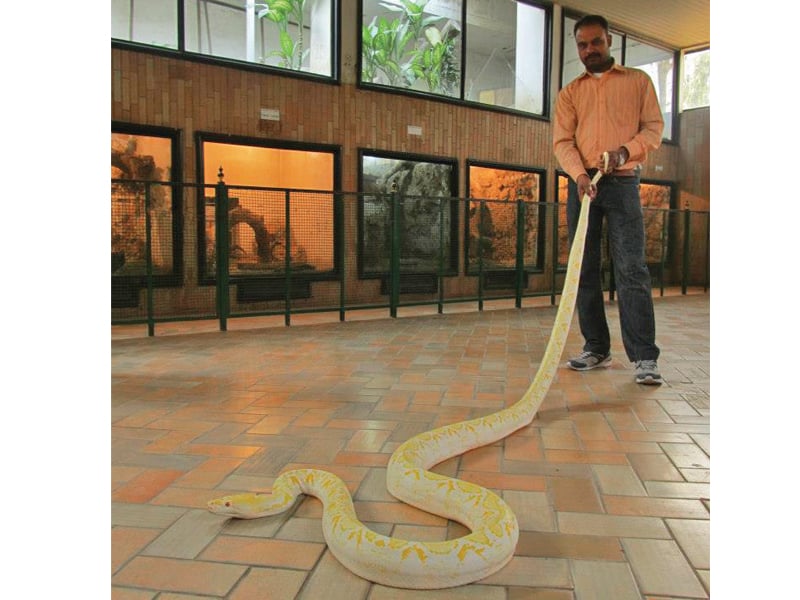
Red spots have appeared on the yellow-skinned, 10-feet-long reticulated albino python, which has been made to live in an enclosure that was previously occupied by venomous snakes. The enclosure is also littered with mites and other insects.
“The allergy is spreading, and this python would soon become weak,” said a reptile expert on the condition of anonymity. “No one at the zoo is qualified to handle these snakes. As a matter of fact, they don’t even know the names of the species.”
Snake enthusiasts in the city had imported 31 non-venomous snakes, including a boa constrictor, and ball and reticulated pythons, from Oklahoma in the United States. The reptiles had left Oklahoma around three weeks back, and landed at Jinnah airport on Sunday. However, Pakistan Customs handed them over to the Karachi Zoological Gardens, as the importers had apparently failed to provide a no-objection certificate from the National Council for Conservation of Wildlife (NCCW).
Most of the pythons are young, and therefore need careful handling, but the zoo administration seems to be ill-equipped to take care of them. “The pythons have been kept in dusty enclosures, which were previously occupied by venomous snakes. No one has bothered to clean the place, which is also infested with insects,” said a snake enthusiast, who was among the hundreds of people who have visited the zoo since Monday.
Some young reptile enthusiasts, who import and breed large snakes, said that authorities needed to put in place proper heating arrangements to keep the pythons alive. “There is just one 200 watt light bulb in the enclosure where two of the largest pythons are kept. That is not enough. Pythons can go weeks without food, but they get uncomfortable in the absence of heat,” said a person who deals in pythons.
“There is little that can be expected from zookeepers. Until recently, they didn’t even know what to call a Keelback Water Snake. And they were feeding it birds, instead of toads,” the dealer added.
Another snake enthusiast who had visited the zoo, said that young pythons, which were just a few weeks old, seemed to have become aggressive. “They are fighting for territory. They are usually wary of human interaction, and need some place to hide.”
When contacted, Karachi zoo director Bashir Sadozai, told The Express Tribune that he was out of town and was therefore unable to say exactly what had happened to the pythons. “But [they probably caught] allergies due to the change in climate and water.”
The entire cost, including freight, for bringing the snakes to the city came to around Rs400,000. Entry fee to the Reptile House, where the pythons are being kept, is Rs10 per person. Adil Ahmed, the owner of the trading company that booked the snake shipment from the US, said it would still take a couple of days before he received the necessary document to satisfy Pakistan Customs.
Published in The Express Tribune, February 21st, 2013.
COMMENTS (6)
Comments are moderated and generally will be posted if they are on-topic and not abusive.
For more information, please see our Comments FAQ

1732090022-0/Elmo-and-Amelia-(1)1732090022-0-165x106.webp)
1725523665-0/Minecraft-Movie-(1)1725523665-0-165x106.webp)

1732089759-0/BeFunky-collage-(75)1732089759-0-165x106.webp)



1732094891-0/Copy-of-Untitled-(52)1732094891-0-270x192.webp)

1732090878-3/Untitled-design-(22)1732090878-3-270x192.webp)






For the Zoo authorites: These snakes are reptiles and you need to stabilize their temperature quickly- they need to bask in sunlight/ any other kind of light immediately. Also clean their tanks and line them with newspaper shredding. Give them some branches to wrap around and someplace where they can hide. Pasting some usseful google links below:
How to care for Ball Pythons at http://exoticpets.about.com/cs/pythons/a/ballpythons_2.htm " Temperature: 80 - 85 F (27 - 29 C) during the day, with a basking spot of around 90 F (32 C). Night time temperatures can fall to around 75 F (23 -24 C) as long as an area of 80 F is maintained. An under the tank heating pad designed for reptiles works well for providing the cage heat, with an incandescent bulb or ceramic heating element used to provide the basking temperatures. Never use hot rocks, and the bulb or heat element should be placed or screened off to prevent contact with the snake or burns may result. Use multiple thermometers to monitor the temperatures in the cage (one at the bottom of the cage and one at the basking spot). •Lighting: Ball Pythons are nocturnal, so have no special lighting requirements. However, they are nocturnal, so incandescent bulbs should not be used at night (to preserve the light/dark cycle the snake needs) - instead use red, blue or black bulbs"
This link is also useful :http://www.reptilechannel.com/care-sheets/burmese-python.aspx
Hope this helps you guys and the snakes survive. Also, has a vet been in to see the snakes? Any vet in Karachi, who is reading this comment, please go to the zoo and look after these animals. Your help could go a long way. Thank you.
The word you are looking for is NOT 'allergies'. These snakes, without a doubt, have contracted respiratory infections. A term the public would be most familiar with is 'pneumonia'. The animals have pneumonia because they have been kept at inadequate temperatures and humidity, and are highly stressed and weakened. They will die unless placed in proper conditions and treated with appropriate antibiotics. (Unless they have a viral illness, but that seems less likely, given the description of the situation). These animals should immediately be confiscated from this zoo, and placed with knowledgeable reptile keepers/rehabilitators. They all need to be seen by a veterinarian.
Hire snake experts from India or Sri Lanka.
@ saad hasan: pythons are non-venomous snakes. why are you calling non-poisonous python
Why didn't the people who imported these snakes check beforehand if the zoo was capable of looking after them properly?
Before these beautiful animals start dying, the zoo authorities need to contact snake experts in the country and get their advice. If the experts don't live in Karachi, then send them a photo of each snake asking for its name and the type of food it eats. Use google to learn more about pythons, their allergies, their treatment and how best to keep them. Please just for this once, don't be incompetant. You need to look for help as soon as possible.